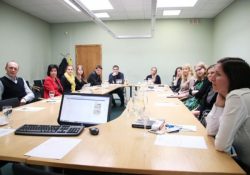 For the second year in a row, the Lituanica Department invited diaspora researchers to the seminar. During the one-day event, the participants heard three presentations about Lithuanian diaspora. Dr Ramūnas Čičelis, the lecturer at Vytautas Magnus University (VMU), talked about the philotopic aspect in Jonas Mekas, an American Lithuanian artist; Akvilė Šimėnienė, who studies in the doctorate program at the Institute of Lithuanian Literature and Folklore, shared her findings about Dr Birutė Ciplijauskaitė’s literary criticism; and the doctorate student at the Lithuanian Academy of Arts, Jolanta Bernotaitytė, discussed the representations of the Lithuanian American art in the 20th century during the sixties and nineties. Vilnius University historian Dr Tomas Balkelis, who spoke about the international aspect of diaspora and migration studies, urged the seminar’s participants to write theirarticles and books not only to a Lithuanian, but a foreign reader as well and their research to look for Lithuanian connections with other nations and communities.
For the second year in a row, the Lituanica Department invited diaspora researchers to the seminar. During the one-day event, the participants heard three presentations about Lithuanian diaspora. Dr Ramūnas Čičelis, the lecturer at Vytautas Magnus University (VMU), talked about the philotopic aspect in Jonas Mekas, an American Lithuanian artist; Akvilė Šimėnienė, who studies in the doctorate program at the Institute of Lithuanian Literature and Folklore, shared her findings about Dr Birutė Ciplijauskaitė’s literary criticism; and the doctorate student at the Lithuanian Academy of Arts, Jolanta Bernotaitytė, discussed the representations of the Lithuanian American art in the 20th century during the sixties and nineties. Vilnius University historian Dr Tomas Balkelis, who spoke about the international aspect of diaspora and migration studies, urged the seminar’s participants to write theirarticles and books not only to a Lithuanian, but a foreign reader as well and their research to look for Lithuanian connections with other nations and communities.
The Head of the Lithuanian Literature Department at VMU, Assoc. Dr Dalia Kuizinienė, noticed that a lot of important research in the field of the Lithuanian diaspora had been carried out over the past 25 years. However, she noted that there are still quite a few holes and gaps remaining. She agreed with Assoc. Dr Žydronė Kolevinskienė, dean of Lithuanian Philology Faculty at the University of Educational Sciences that not a lot has been done to research the most recent Lithuanian emigrant literature, Lithuanian foreign press, as well as theatre and visual arts.
At the end of the seminar, a book presentation, The nostalgia and mimicry: Lithuanian and Latvian post-war diaspora novels by Laura Laurušaitė (Vilnius: Institute of Lithuanian Literature and Folklore), took place. Guests, Dr Manfredas Žvirgždas, Assoc. Dr Kuizinienė and Dr Čičelis, stressed the novelty of the book, especially the methodological tools, comparative and postcolonial perspectives, and their successful adaptation for Lithuanian and Latvian emigrant novels. The author of the monograph noted that one of her main objectives while writing the book was to introduce Lithuanian readers to a rich Latvian diaspora prose, especially bearing in mind that not a single work from more than 400 Latvian diaspora novels published in post-war is available in Lithuanian language.
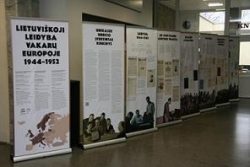 After the successful presentations in Norway, Switzerland, and Italy, the travelling exhibition “Lithuanian Publishing in Post-WWII Europe” is back in Lithuania. On 27 January 2016 it was opened at Pasvalys Marius Katiliškis Public Library as part of a day-long event “The Library and the 21st Century Society”. Opening remarks were delivered by Jolanta Budriūnienė, head of the Lithuanian Studies Research Department (former Lituanica Department) of the National Library of Lithuania, who noted that the collection of Lithuanian DP publishing, 1945-1952, housed at the National Library of Lithuania, is of particular value for its unique content, produced under extremely difficult conditions. In 2011, it was recognized by UNESCO — the collection was included in UNESCO’s “World Memory” programme for the Lithuanian National Register. Pasvalys M. Katiliškis Public Library is only the first stop for this exhibition. Its organizer, the National Library of Lithuania, is planning to take it to all major public libraries in the country.
After the successful presentations in Norway, Switzerland, and Italy, the travelling exhibition “Lithuanian Publishing in Post-WWII Europe” is back in Lithuania. On 27 January 2016 it was opened at Pasvalys Marius Katiliškis Public Library as part of a day-long event “The Library and the 21st Century Society”. Opening remarks were delivered by Jolanta Budriūnienė, head of the Lithuanian Studies Research Department (former Lituanica Department) of the National Library of Lithuania, who noted that the collection of Lithuanian DP publishing, 1945-1952, housed at the National Library of Lithuania, is of particular value for its unique content, produced under extremely difficult conditions. In 2011, it was recognized by UNESCO — the collection was included in UNESCO’s “World Memory” programme for the Lithuanian National Register. Pasvalys M. Katiliškis Public Library is only the first stop for this exhibition. Its organizer, the National Library of Lithuania, is planning to take it to all major public libraries in the country. After the successful presentations in Norway, Switzerland, and Italy, the travelling exhibition “Lithuanian Publishing in Post-WWII Europe” is back in Lithuania. On 27 January 2016 it was opened at Pasvalys Marius Katiliškis Public Library as part of a day-long event “The Library and the 21st Century Society”. Opening remarks were delivered by Jolanta Budriūnienė, head of the Lithuanian Studies Research Department (former Lituanica Department) of the National Library of Lithuania, who noted that the collection of Lithuanian DP publishing, 1945-1952, housed at the National Library of Lithuania, is of particular value for its unique content, produced under extremely difficult conditions. In 2011, it was recognized by UNESCO — the collection was included in UNESCO’s “World Memory” programme for the Lithuanian National Register. Pasvalys M. Katiliškis Public Library is only the first stop for this exhibition. Its organizer, the National Library of Lithuania, is planning to take it to all major public libraries in the country.
After the successful presentations in Norway, Switzerland, and Italy, the travelling exhibition “Lithuanian Publishing in Post-WWII Europe” is back in Lithuania. On 27 January 2016 it was opened at Pasvalys Marius Katiliškis Public Library as part of a day-long event “The Library and the 21st Century Society”. Opening remarks were delivered by Jolanta Budriūnienė, head of the Lithuanian Studies Research Department (former Lituanica Department) of the National Library of Lithuania, who noted that the collection of Lithuanian DP publishing, 1945-1952, housed at the National Library of Lithuania, is of particular value for its unique content, produced under extremely difficult conditions. In 2011, it was recognized by UNESCO — the collection was included in UNESCO’s “World Memory” programme for the Lithuanian National Register. Pasvalys M. Katiliškis Public Library is only the first stop for this exhibition. Its organizer, the National Library of Lithuania, is planning to take it to all major public libraries in the country.
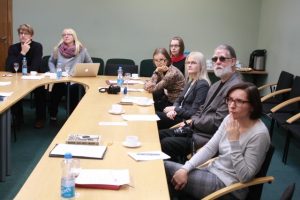 On 3 November 2015 the Martynas Mažvydas National Library of Lithuania hosted the annual international Baltic Heritage Network diaspora seminar. It was the 22nd event in the last six years and the second to be held in Vilnius. It brought together researchers, librarians and archivists from all three Baltic countries working in the field of diaspora studies. In this international forum, eight papers were presented. Topics for three paper sessions ranged from collecting, exploring and digitizing archival data to making field research of diaspora communities, and analysing exile literature.
On 3 November 2015 the Martynas Mažvydas National Library of Lithuania hosted the annual international Baltic Heritage Network diaspora seminar. It was the 22nd event in the last six years and the second to be held in Vilnius. It brought together researchers, librarians and archivists from all three Baltic countries working in the field of diaspora studies. In this international forum, eight papers were presented. Topics for three paper sessions ranged from collecting, exploring and digitizing archival data to making field research of diaspora communities, and analysing exile literature.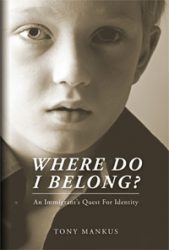 At the age of five, Tony Mankus along with his family was forced to leave Lithuania during World War II. The feeling and even pain of being exiled has never left him, neither in his young days spent in the DP camp in Germany, nor in old age living in the United States. “Where do I belong? Where is my place?” are key questions that Mankus tries to answer in his book “Where Do I Belong To?: An Immigrant’s Quest for Identity”(2013). This frank and unsentimental story will be of a special interest to those readers who want to learn more about authentic experiences of immigrants.
At the age of five, Tony Mankus along with his family was forced to leave Lithuania during World War II. The feeling and even pain of being exiled has never left him, neither in his young days spent in the DP camp in Germany, nor in old age living in the United States. “Where do I belong? Where is my place?” are key questions that Mankus tries to answer in his book “Where Do I Belong To?: An Immigrant’s Quest for Identity”(2013). This frank and unsentimental story will be of a special interest to those readers who want to learn more about authentic experiences of immigrants.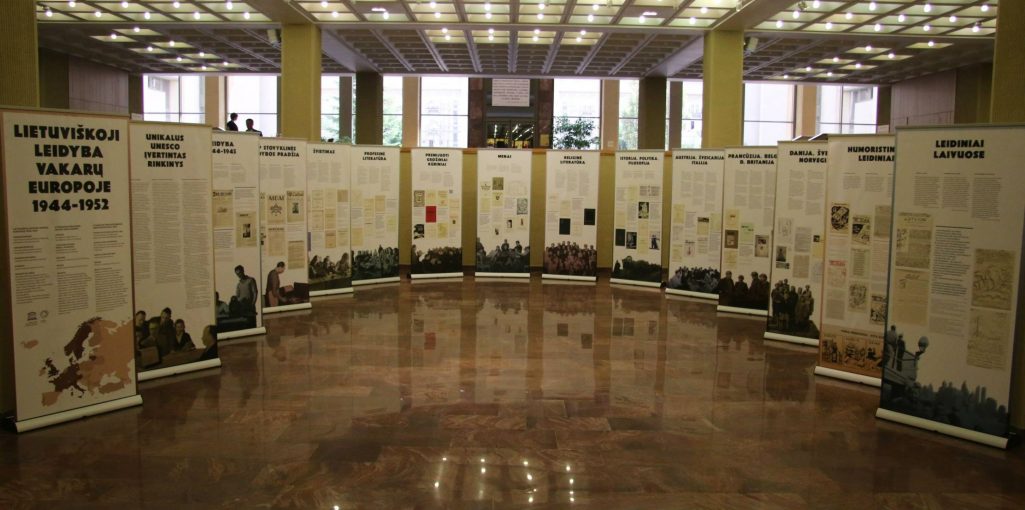
 In the opening speech, the head of the Department, Jolanta Budriūnienė, talked about the idea of the exhibition – using the rich collection of Lithuanian DP Publishing, 1945-1952, housed at the National Library of Lithuania to commemorate 70 years since the mass westward flight of the Baltic Displaced Persons, refugees from war-torn Lithuania. It should be noted that in 2011, the collection was recognised as part of Lithuania’s documentary heritage and included in the UNESCO’s program “World Memory” for the Lithuanian National Register.
In the opening speech, the head of the Department, Jolanta Budriūnienė, talked about the idea of the exhibition – using the rich collection of Lithuanian DP Publishing, 1945-1952, housed at the National Library of Lithuania to commemorate 70 years since the mass westward flight of the Baltic Displaced Persons, refugees from war-torn Lithuania. It should be noted that in 2011, the collection was recognised as part of Lithuania’s documentary heritage and included in the UNESCO’s program “World Memory” for the Lithuanian National Register.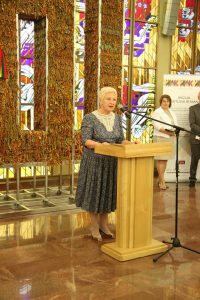 The Deputy Speaker of Lithuanian Parliament and the hostess of the exhibition, Irena Degutienė, stressed that at the end of WWII, while Europe was freeing itself, in Lithuania, guerrilla fighting had only intensified and the mass deportations were taking place. Thus, it is not surprising that Lithuanian publishing, exiled from the homeland, had to establish itself in the West. “Our language was alive and will be alive, because everything depends on our willingness to speak the language, regardless of where one lives,” Degutienė concluded her speech.
The Deputy Speaker of Lithuanian Parliament and the hostess of the exhibition, Irena Degutienė, stressed that at the end of WWII, while Europe was freeing itself, in Lithuania, guerrilla fighting had only intensified and the mass deportations were taking place. Thus, it is not surprising that Lithuanian publishing, exiled from the homeland, had to establish itself in the West. “Our language was alive and will be alive, because everything depends on our willingness to speak the language, regardless of where one lives,” Degutienė concluded her speech. For the second year in a row, the Lituanica Department invited diaspora researchers to the seminar. During the one-day event, the participants heard three presentations about Lithuanian diaspora. Dr Ramūnas Čičelis, the lecturer at Vytautas Magnus University (VMU), talked about the philotopic aspect in Jonas Mekas, an American Lithuanian artist; Akvilė Šimėnienė, who studies in the doctorate program at the Institute of Lithuanian Literature and Folklore, shared her findings about Dr Birutė Ciplijauskaitė’s literary criticism; and the doctorate student at the Lithuanian Academy of Arts, Jolanta Bernotaitytė, discussed the representations of the Lithuanian American art in the 20th century during the sixties and nineties. Vilnius University historian Dr Tomas Balkelis, who spoke about the international aspect of diaspora and migration studies, urged the seminar’s participants to write theirarticles and books not only to a Lithuanian, but a foreign reader as well and their research to look for Lithuanian connections with other nations and communities.
For the second year in a row, the Lituanica Department invited diaspora researchers to the seminar. During the one-day event, the participants heard three presentations about Lithuanian diaspora. Dr Ramūnas Čičelis, the lecturer at Vytautas Magnus University (VMU), talked about the philotopic aspect in Jonas Mekas, an American Lithuanian artist; Akvilė Šimėnienė, who studies in the doctorate program at the Institute of Lithuanian Literature and Folklore, shared her findings about Dr Birutė Ciplijauskaitė’s literary criticism; and the doctorate student at the Lithuanian Academy of Arts, Jolanta Bernotaitytė, discussed the representations of the Lithuanian American art in the 20th century during the sixties and nineties. Vilnius University historian Dr Tomas Balkelis, who spoke about the international aspect of diaspora and migration studies, urged the seminar’s participants to write theirarticles and books not only to a Lithuanian, but a foreign reader as well and their research to look for Lithuanian connections with other nations and communities.